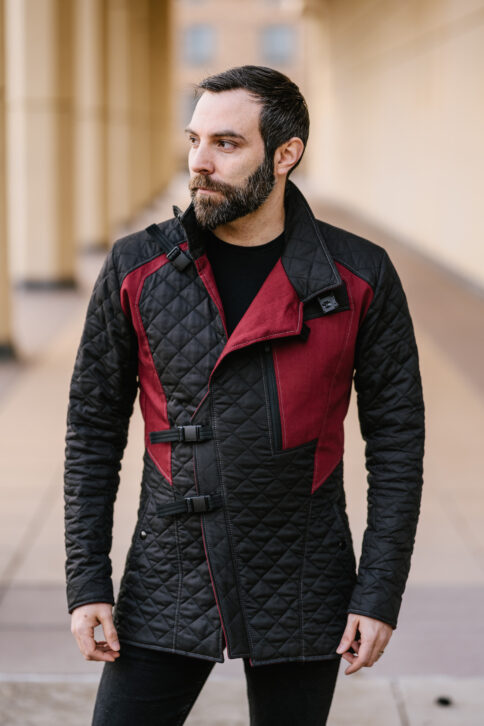 David Volante
David Volante
Wayfinder has a long history, running its first event in December 2001. Over the years many amazing people have been involved in contributing to the space, helping to shape the camp we have today. Many have gone on to do other amazing things out in the world, one of those people is David Volante, or as I met him, Panda. David is the man behind Volante Design, an innovative hand made clothing company that brings video game, fantasy and comic book-inspired fashion to life.
David was a regular at camp from its inception to 2006. Since he was already 15 when Wafinder incorporated, he attended camp and then ended up volunteering to play any Adventure Games he could. Panda’s way into characters was always through costumes. “ I’ve always designed characters for as long as I can remember. And Wayfinder was an opportunity for me to take those ideas and make them something physical.” Though David made these costumes for himself at first, there were times when WFE hired him to make “costumes for key characters in certain games.”
He is one of the two people behind our infamous Veils weekend series where players were in character for a full 36 hours. “I mostly worked on the production side of that, making a ridiculous amount of costumes for it.” The first Veils was such a hit, they did a second one where Panda went deeper into creating. “We built a bunch of monster costumes. We built a scorpion costume that was part of a recumbent three wheel bicycle. That is already the triangle shape of a scorpion, so we just made a tail on it, and then we had these giant claws on the front. It was designed in such a way that you could take the tail off and wear it as a backpack. The person who was playing the scorpion was able to ride around on this bike and be a giant scorpion, and then transform into their humanoid form. It was really fun.”
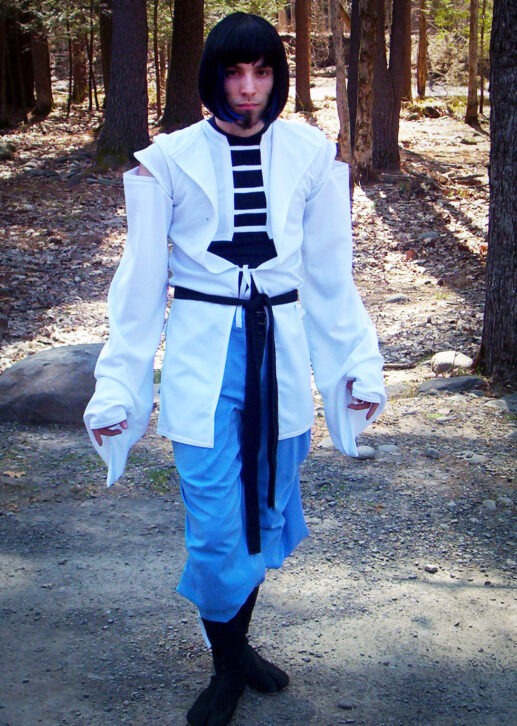 Like many of us, running a business is not what David set out to do, but life had other plans, so he just ‘went with the flow’. “I went to college for animation, so I wasn’t planning on getting into fashion or having a clothing design company or anything like that. I thought, ‘Where did this come from?’” He goes on to say that he ran into a Wafinder founding member at a convention, which was where Volante got its start. “I was like, this is it, ‘isn’t this crazy? Who would have guessed that I would have had a fashion company like this?’ And he’s like, ‘I would have guessed that you had a fashion company like this; it makes sense 100%.’ And I realized, ‘Oh, it does make sense 100%.’ I had thought it was sort of completely out of the blue. I hadn’t made the connection that everything that I did at Wayfinder tied directly into what my professional career ended up being”
Like many of us, running a business is not what David set out to do, but life had other plans, so he just ‘went with the flow’. “I went to college for animation, so I wasn’t planning on getting into fashion or having a clothing design company or anything like that. I thought, ‘Where did this come from?’” He goes on to say that he ran into a Wafinder founding member at a convention, which was where Volante got its start. “I was like, this is it, ‘isn’t this crazy? Who would have guessed that I would have had a fashion company like this?’ And he’s like, ‘I would have guessed that you had a fashion company like this; it makes sense 100%.’ And I realized, ‘Oh, it does make sense 100%.’ I had thought it was sort of completely out of the blue. I hadn’t made the connection that everything that I did at Wayfinder tied directly into what my professional career ended up being”
Even the way David designs the clothes is tied into LARP experiences. “I think about the utility when thinking about the costume, not in terms of what a character should look like or whether or not that’s cool looking, but also in terms of ‘I’m gonna have to carry stuff, I’m gonna have to carry my sword, I’m gonna have to carry a bunch of magic bolts or whatever other bits of stuff that I need to make my character be able to do things he’s supposed to do.” Volante, in order to make their designs, needed to get licenses from the different intellectual properties that inspired them, “It allows me to take the character design that I’m inspired by and translate it into something that is intended for daily use.” But the process of getting those licenses isn’t easy, in part because it is “different every time. We contacted PlayStation two years before we got the license. We talked to them, and they were like, ‘this is really cool, but you need to have a portfolio of other licenses before you can work with PlayStation.’”
“What we ended up doing was pursuing much smaller licenses. With the intent that these tiny licenses will build up a portfolio.” Now they have quite the list of partners. “We’ve done a bunch of licenses over the last six years or so. We’ve worked with PlayStation, Star Trek, Devil May Cry and more” But the one that he wishes to get, “I’d loved to work with Destiny. The Witcher and Cyberpunk would be awesome too”
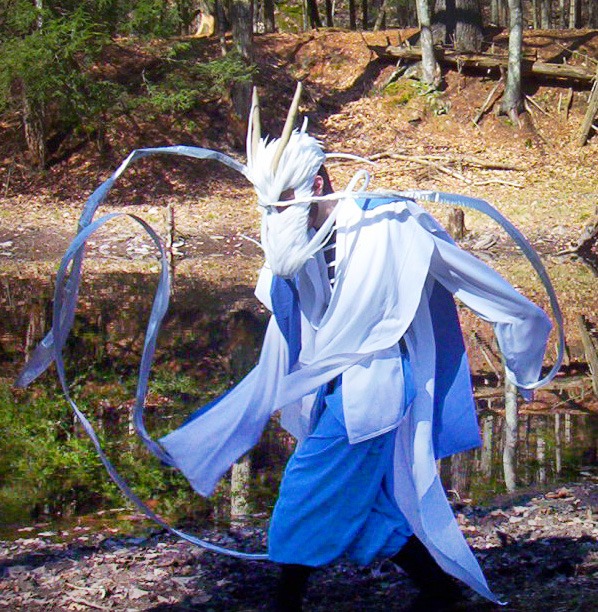 The entrepreneurial spirit was always within David, a graduate of Hampshire College, where he LARPed and ran programs on campus every week for four years. He would get people to join in the fun the same way he gets people to try on his clothes at conventions. “I’d just hand this sword to them and they’d be like, ‘Sure, I’ll take that sword. Why not, right?’ And then I’d fight them.” Whereas at conventions he will “size them up and just pull something off the rack and hand it to them. My ideal, like my best sales tactic, is not to say a word.” It is an offer to play, a way to say you are allowed to try this on, in fact I encourage you too.
The entrepreneurial spirit was always within David, a graduate of Hampshire College, where he LARPed and ran programs on campus every week for four years. He would get people to join in the fun the same way he gets people to try on his clothes at conventions. “I’d just hand this sword to them and they’d be like, ‘Sure, I’ll take that sword. Why not, right?’ And then I’d fight them.” Whereas at conventions he will “size them up and just pull something off the rack and hand it to them. My ideal, like my best sales tactic, is not to say a word.” It is an offer to play, a way to say you are allowed to try this on, in fact I encourage you too.
After finishing his final project at Hampshire, he realized animation was not for him. “I was animating about 12 hours a day for six months. And I got to the end and I had a three and a half minute short film for it, but as soon as I finished it, I was like, boy, do I not wanna do that for the rest of my life.” Low on cash and in need of clothes, he started making cool things for himself that made him feel like a “ fantasy character, which was a really awesome feeling “ and he thought “I can bring this into my daily life.” Then his friends started asking if he could make them these cool clothes and he realized this really could pay the bills. He realized it was a great way to bring something you love with you. When playing a video game we become very connected to them, David would think ”I love this character and I really identify with them, and I feel really awesome when I’m playing them. But then I turn off the game and get up, and it’s back to my normal life. But to be able to bring just a little bit of that with you in the way that you are dressed, it’s kind of life changing.”
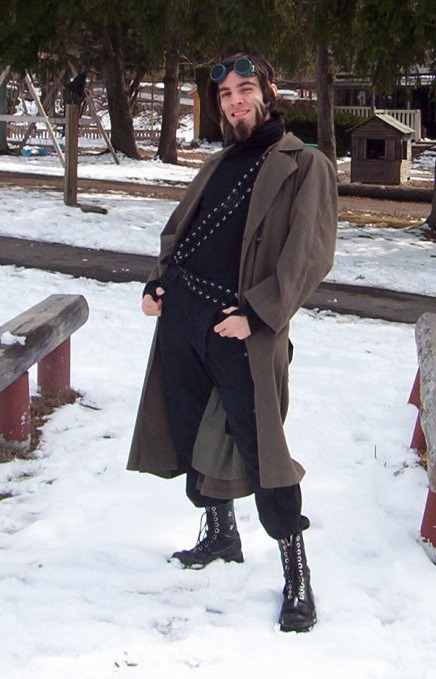 At the heart of Volante Design is empowerment, just like Wayfinder. LARPing gives us chances to do things that we might never do in our real lives. “I feel like most people at some point while at Wayfinder get this feeling of ‘yeah, I was a badass, I was in a fight and I had a sword.’ Most people don’t have the opportunity to feel badass.” But with David’s clothes they do. There is one moment in a Wayfinder Adventure Game that David recalls as very particularly badass. It was in a game called Secret Worlds where players could be any character from any fictional world. “I was Kohaku from “Spirited Away”. I made myself a cool costume, and a second dragon costume was carried in a backpack so I could transform.” For those who are unfamiliar with Spirited Away, Kohaku is a river dragon who can turn into a boy. David was on his way to the final battle and there was a line of people walking a small piece of land between two bodies of water “I wanted to head off the group and protect them, because that felt in character. But I was behind the group and I wanted to get in front, so I transformed into a dragon (which no one had seen yet) with this long white tail trailing and I sprinted and I went around the group and through the water, but my shoes didn’t get wet!” Afterwards, Brennan (check out our blog posts about him) had noted the same thing. “He was like, ‘you ran on water’ and I was like, ‘that’s very cool. But he was like, ‘dude, for real, that was the coolest thing I’ve ever seen because you actually ran on water around us.”
At the heart of Volante Design is empowerment, just like Wayfinder. LARPing gives us chances to do things that we might never do in our real lives. “I feel like most people at some point while at Wayfinder get this feeling of ‘yeah, I was a badass, I was in a fight and I had a sword.’ Most people don’t have the opportunity to feel badass.” But with David’s clothes they do. There is one moment in a Wayfinder Adventure Game that David recalls as very particularly badass. It was in a game called Secret Worlds where players could be any character from any fictional world. “I was Kohaku from “Spirited Away”. I made myself a cool costume, and a second dragon costume was carried in a backpack so I could transform.” For those who are unfamiliar with Spirited Away, Kohaku is a river dragon who can turn into a boy. David was on his way to the final battle and there was a line of people walking a small piece of land between two bodies of water “I wanted to head off the group and protect them, because that felt in character. But I was behind the group and I wanted to get in front, so I transformed into a dragon (which no one had seen yet) with this long white tail trailing and I sprinted and I went around the group and through the water, but my shoes didn’t get wet!” Afterwards, Brennan (check out our blog posts about him) had noted the same thing. “He was like, ‘you ran on water’ and I was like, ‘that’s very cool. But he was like, ‘dude, for real, that was the coolest thing I’ve ever seen because you actually ran on water around us.”
We are so grateful that Panda took the time to meet with us, and let us know how his life changed over the years. It’s amazing how having the space and time to just do what you are naturally drawn to and a chance to feel like a badass can empower people to make all kinds of magic out in the “real” world. Despite being busy with a family and a business, he still finds time for new video games for inspiration. This is someone who loves his work. “My business truly brings me joy.”
Written by Trine Boode-Petersen March 2025 from an interview in 2024
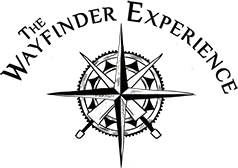



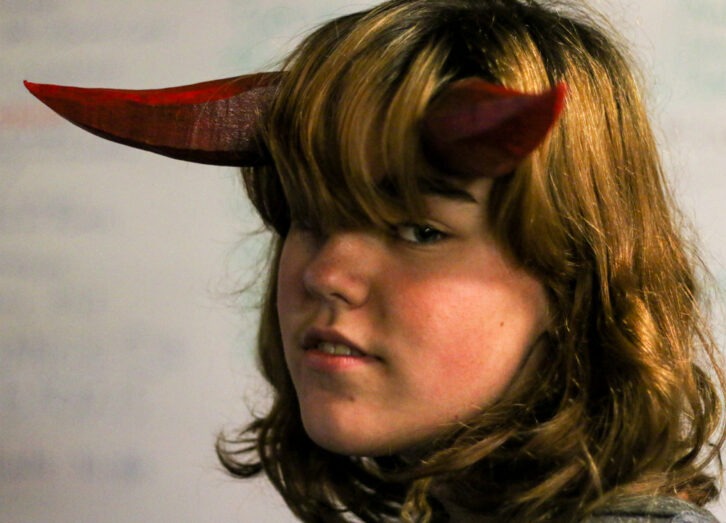 Finding your people, the ones that make you feel grounded and happy, is a huge part of life. Wayfinder, for many people, has been the place where they find their people. And that was just the case for Ruby, or as she is known around camp – Grub. “I met my long term partner, lots of friends, and my business partner at Wayfinder.” She started attending in 2004, first as a camper, then apprentice and ultimately staff member. She spent most of her time as a staff member in the production spaces, writing Adventure Games and serving as a member of our Story Board for years.
Finding your people, the ones that make you feel grounded and happy, is a huge part of life. Wayfinder, for many people, has been the place where they find their people. And that was just the case for Ruby, or as she is known around camp – Grub. “I met my long term partner, lots of friends, and my business partner at Wayfinder.” She started attending in 2004, first as a camper, then apprentice and ultimately staff member. She spent most of her time as a staff member in the production spaces, writing Adventure Games and serving as a member of our Story Board for years.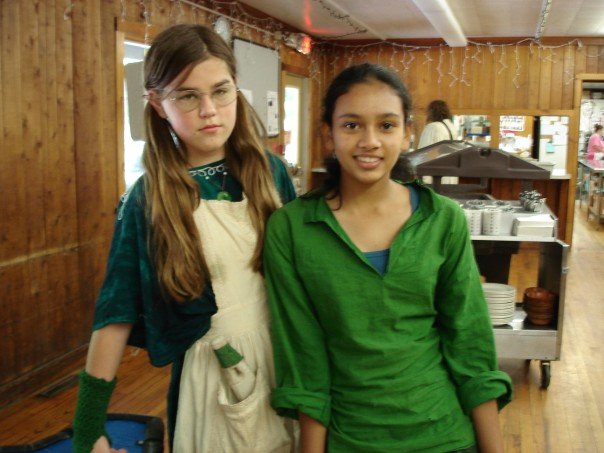 How does one prepare for the trials of running their small business, when you are the type of person who needs to make sure everything gets done? Practice, of course. Though some people have to wait until later in life for these opportunities to practice, Wayfinder participants get that practice in a low stakes and safe environment, which is running Adventure Games. Grub says, “I’ve been talking about this a lot recently. I ran my first Adventure Game when I was 14. It’s a crazy thing that we [Wayfinder] do to let teenagers run these games, because we put in a lot of time and money and people’s efforts and creative work and trust. But as a creative teenager, it is the most empowering experience that you can get.” And that is a huge part of why we do it! At its heart, Wayfinder is a place for people of all ages to feel empowered!
How does one prepare for the trials of running their small business, when you are the type of person who needs to make sure everything gets done? Practice, of course. Though some people have to wait until later in life for these opportunities to practice, Wayfinder participants get that practice in a low stakes and safe environment, which is running Adventure Games. Grub says, “I’ve been talking about this a lot recently. I ran my first Adventure Game when I was 14. It’s a crazy thing that we [Wayfinder] do to let teenagers run these games, because we put in a lot of time and money and people’s efforts and creative work and trust. But as a creative teenager, it is the most empowering experience that you can get.” And that is a huge part of why we do it! At its heart, Wayfinder is a place for people of all ages to feel empowered! Though Grub has written a number of great games over the years, the Sets & Props department is her true home at Wayfinder. “As a graphic designer, I love to make paper props–I love to make scrolls and maps and posters. I also love to make a ritual scene that is just like rocks stacked ever so perfectly with candles, that’s really juicy for me. I love incorporating nature into the scene. When I’m going into the woods to build a scene, I don’t want to carry that much stuff–I want to maybe have one tote and then walk it out into the woods and add ferns and flowers as I find them.” Whenever she has free time she enjoys “arts and crafts. But that’s kind of a gimme. That’s why I’ve been a sets and props person my whole life. I also really like to cook and make little fanciful drinkies–I’m an alchemist!”
Though Grub has written a number of great games over the years, the Sets & Props department is her true home at Wayfinder. “As a graphic designer, I love to make paper props–I love to make scrolls and maps and posters. I also love to make a ritual scene that is just like rocks stacked ever so perfectly with candles, that’s really juicy for me. I love incorporating nature into the scene. When I’m going into the woods to build a scene, I don’t want to carry that much stuff–I want to maybe have one tote and then walk it out into the woods and add ferns and flowers as I find them.” Whenever she has free time she enjoys “arts and crafts. But that’s kind of a gimme. That’s why I’ve been a sets and props person my whole life. I also really like to cook and make little fanciful drinkies–I’m an alchemist!”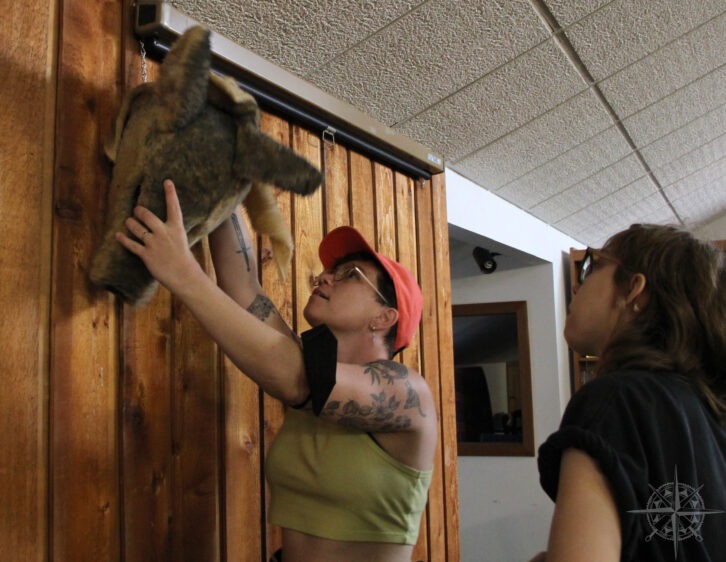
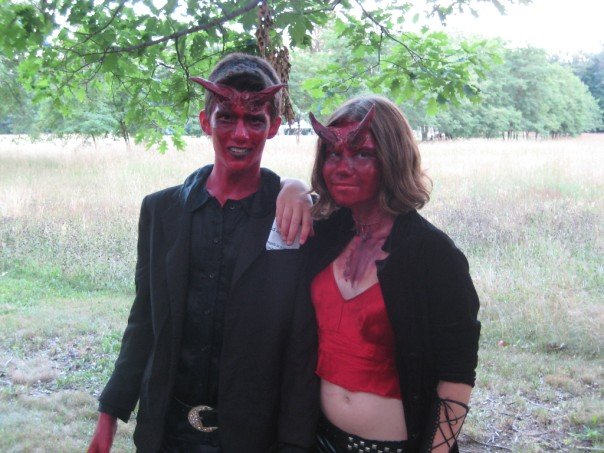 She is striving for something important and magical with her work, something that many of our community members are also seeking: representation of their identities in the media. “Many of us queer people are just like, where are our stories? Where are the stories that help us explore our identities? That aren’t just about coming out of the closet or being oppressed in some way? There’s other experiences that people who are queer have that are unique and individual that are rarely explored in mainstream art. That’s what I’m really interested in with my work. And I’m always trying to find out new ways to talk about queerness and talk about queer love in all its forms: romantic, platonic, familial, self love, the complexities of it. There’s so much more than what we’ve been given.”
She is striving for something important and magical with her work, something that many of our community members are also seeking: representation of their identities in the media. “Many of us queer people are just like, where are our stories? Where are the stories that help us explore our identities? That aren’t just about coming out of the closet or being oppressed in some way? There’s other experiences that people who are queer have that are unique and individual that are rarely explored in mainstream art. That’s what I’m really interested in with my work. And I’m always trying to find out new ways to talk about queerness and talk about queer love in all its forms: romantic, platonic, familial, self love, the complexities of it. There’s so much more than what we’ve been given.”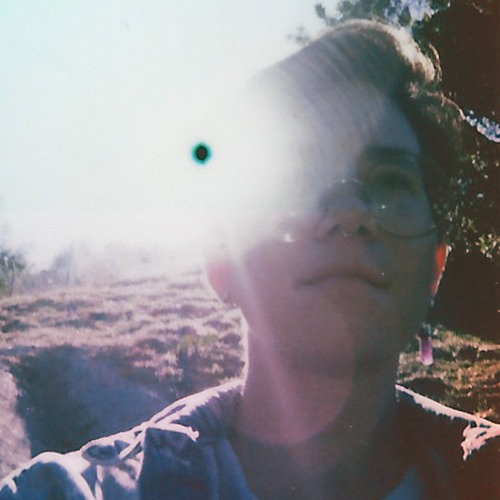 Besides working on these amazing books, Molly worked for years as a show creator for a pilot for Disney that unfortunately did not make it to screen. Now that she no longer works for Disney, Molly has many other creative projects percolating and I’m sure we will see something new and exciting before long.
Besides working on these amazing books, Molly worked for years as a show creator for a pilot for Disney that unfortunately did not make it to screen. Now that she no longer works for Disney, Molly has many other creative projects percolating and I’m sure we will see something new and exciting before long.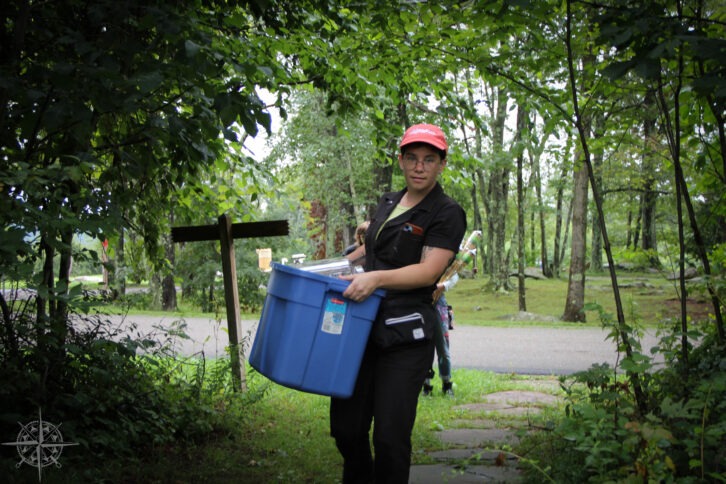 On a more personal level, another big takeaway for Molly is something universal. “Having a place where you get to be yourself, even if it’s for one week out of the year – you then get to experience that. You get to learn about yourself.” And she has done the one thing we make sure to tell everyone to try to do out in the greater world which is, bringing connection and essence of play with you. In her life Molly has been working on doing just that. By asking “how can I make more places like this? How do you carry it? In-person spaces where people get to work together, care for each other and be joined by a common interest and a common passion are so powerful. It feels like [a] super power to be someone who knows how to organize an in-person event and knows the power of gathering people. It has a ripple effect on the rest of your life and the rest of the world.” And that is a super power we could all use in this world.
On a more personal level, another big takeaway for Molly is something universal. “Having a place where you get to be yourself, even if it’s for one week out of the year – you then get to experience that. You get to learn about yourself.” And she has done the one thing we make sure to tell everyone to try to do out in the greater world which is, bringing connection and essence of play with you. In her life Molly has been working on doing just that. By asking “how can I make more places like this? How do you carry it? In-person spaces where people get to work together, care for each other and be joined by a common interest and a common passion are so powerful. It feels like [a] super power to be someone who knows how to organize an in-person event and knows the power of gathering people. It has a ripple effect on the rest of your life and the rest of the world.” And that is a super power we could all use in this world. This week’s entry into the Where Are They Now series is centered on Kyle Perler. While Kyle is another creative type who came through Wayfinder, he works in a field where the connection to the work we do may seem a little less direct. Kyle runs his own photography business. While his introduction to the world of photography came through his family, Kyle still credits Wayfinder (or Adventure Game Theatre where Kyle, much like Wayfinder, started his experience with LARP) with a lot of skills he uses on a day to day basis. “I have a career where I am often standing in front of dozens of strangers who want to be doing other things, and I have to make them do what I tell them to by loudly, clearly, and confidently asserting myself. That is something that I never would have been able to do had I not been given the preparation and courage, and also the ability to focus on the role I’m in. I wouldn’t have been able to do that without Wayfinder.” The career Kyle is talking about is the photography business he runs where he works for the city of Boston, the state of Massachusetts, and fortune 500 companies. He has also published two books. As has been clear in every one of these features, Wayfinder gives people the confidence they need to succeed in their respective fields. It can provide more than confidence though.
This week’s entry into the Where Are They Now series is centered on Kyle Perler. While Kyle is another creative type who came through Wayfinder, he works in a field where the connection to the work we do may seem a little less direct. Kyle runs his own photography business. While his introduction to the world of photography came through his family, Kyle still credits Wayfinder (or Adventure Game Theatre where Kyle, much like Wayfinder, started his experience with LARP) with a lot of skills he uses on a day to day basis. “I have a career where I am often standing in front of dozens of strangers who want to be doing other things, and I have to make them do what I tell them to by loudly, clearly, and confidently asserting myself. That is something that I never would have been able to do had I not been given the preparation and courage, and also the ability to focus on the role I’m in. I wouldn’t have been able to do that without Wayfinder.” The career Kyle is talking about is the photography business he runs where he works for the city of Boston, the state of Massachusetts, and fortune 500 companies. He has also published two books. As has been clear in every one of these features, Wayfinder gives people the confidence they need to succeed in their respective fields. It can provide more than confidence though.
 The Wayfinder/AGT experience was just totally life changing. It really has not only crafted me into the adult I am today as far as how I know the world, how confident I am, how willing I am to approach new situations and say yes to things even if I’m afraid to do it, or even if it’s not going to go the way I want it to. Being ready to approach a new situation is something that is ingrained in who I am, and it is that way because of this camp. Not only that, but I am still so close to the community because of the bond that it builds with people. I have one friend from that previous camp, and I wouldn’t have reconnected with her if we hadn’t gone to the same school together. So far this year I have interacted with, spent time with, and seen about ten people that I went to AGT with because it really is a community. Because of the bonds that are created, and the environment that it’s in, and the people that it attracts, they really are people that stick with you and become part of your life, and they don’t just fade out when summer ends.
The Wayfinder/AGT experience was just totally life changing. It really has not only crafted me into the adult I am today as far as how I know the world, how confident I am, how willing I am to approach new situations and say yes to things even if I’m afraid to do it, or even if it’s not going to go the way I want it to. Being ready to approach a new situation is something that is ingrained in who I am, and it is that way because of this camp. Not only that, but I am still so close to the community because of the bond that it builds with people. I have one friend from that previous camp, and I wouldn’t have reconnected with her if we hadn’t gone to the same school together. So far this year I have interacted with, spent time with, and seen about ten people that I went to AGT with because it really is a community. Because of the bonds that are created, and the environment that it’s in, and the people that it attracts, they really are people that stick with you and become part of your life, and they don’t just fade out when summer ends.
 While Nick talked a lot about the ways in which Wayfinder has helped him in regards to playing characters he has been cast as, he also went into the ways it has helped him in landing those roles. “There’s an absolute silliness in like running around being a merman. I had an audition where I had to play someone who was glitching, and I wasn’t afraid to do something that seemed silly or seemed totally random.” That kind of playful spirit is something that Wayfinder encourages (and something that Nick has always embodied with ease). The intersection between play and work (particularly work in a creative field) is something that we think about a lot at Wayfinder, and it’s something that Nick clearly picked up on. “What I learned about at Wayfinder was just that it’s ok, there’s no shame in playing, and there’s no shame in getting to explore a character as fully as you can, and also because you’re playing all these Games you get really good at improv, you also get an understanding of story. We played a lot of kind of archetypal Games and so I feel like having been parts of stories, it helps you tell them and see what really affects people.” The lessons that we teach (and learn) in Game and throughout the week are such a big part of the work that we do.
While Nick talked a lot about the ways in which Wayfinder has helped him in regards to playing characters he has been cast as, he also went into the ways it has helped him in landing those roles. “There’s an absolute silliness in like running around being a merman. I had an audition where I had to play someone who was glitching, and I wasn’t afraid to do something that seemed silly or seemed totally random.” That kind of playful spirit is something that Wayfinder encourages (and something that Nick has always embodied with ease). The intersection between play and work (particularly work in a creative field) is something that we think about a lot at Wayfinder, and it’s something that Nick clearly picked up on. “What I learned about at Wayfinder was just that it’s ok, there’s no shame in playing, and there’s no shame in getting to explore a character as fully as you can, and also because you’re playing all these Games you get really good at improv, you also get an understanding of story. We played a lot of kind of archetypal Games and so I feel like having been parts of stories, it helps you tell them and see what really affects people.” The lessons that we teach (and learn) in Game and throughout the week are such a big part of the work that we do.

 The path from Wayfinder to the work our alumni do in their respective creative fields can often be an easy one to see. The connections between the work we do at camp and the work someone does writing, acting, or making art are all fairly clear. What is not always clear, but is incredibly important to remember, is that that path is not always an easy one to walk. Camp hopefully helps to prepare you for the difficulties you’ll find as you push forward, but just keeping in mind that you are worth it and have to keep pushing forward is something Tigre stressed heavily and wanted to make sure was in view with his story. He moved out to Oakland from Philadelphia six years ago. “I was teaching, and I was working as a barista, and I was in Philly kind of doing art, being creative but not really finding a flow and kind of stumbling through stuff. Then I moved out to California, and big part of moving was ‘I want to focus my life around making art, and I want to really do this and I don’t know how it’s going to go.’” After a number of years of struggle, having “different hustles” ranging from selling jewelry on the side of the street to working in cafés, Tigre has been able to find some success as a sculptor creating installations for festivals all over the world (enough success that he’s been able to leave behind the other hustles). “It was like this seems to be happening, and when I was doing other stuff it felt like I was wasting my time. When I was in the café washing dishes I was like ‘what am I doing, like I was just on the other side of the world making this huge art piece and seeing people respond to it really powerfully’, and eventually I was like ‘I’m just going to make art and live off that and see what happens and the first year was really tenuous and hard.’”
The path from Wayfinder to the work our alumni do in their respective creative fields can often be an easy one to see. The connections between the work we do at camp and the work someone does writing, acting, or making art are all fairly clear. What is not always clear, but is incredibly important to remember, is that that path is not always an easy one to walk. Camp hopefully helps to prepare you for the difficulties you’ll find as you push forward, but just keeping in mind that you are worth it and have to keep pushing forward is something Tigre stressed heavily and wanted to make sure was in view with his story. He moved out to Oakland from Philadelphia six years ago. “I was teaching, and I was working as a barista, and I was in Philly kind of doing art, being creative but not really finding a flow and kind of stumbling through stuff. Then I moved out to California, and big part of moving was ‘I want to focus my life around making art, and I want to really do this and I don’t know how it’s going to go.’” After a number of years of struggle, having “different hustles” ranging from selling jewelry on the side of the street to working in cafés, Tigre has been able to find some success as a sculptor creating installations for festivals all over the world (enough success that he’s been able to leave behind the other hustles). “It was like this seems to be happening, and when I was doing other stuff it felt like I was wasting my time. When I was in the café washing dishes I was like ‘what am I doing, like I was just on the other side of the world making this huge art piece and seeing people respond to it really powerfully’, and eventually I was like ‘I’m just going to make art and live off that and see what happens and the first year was really tenuous and hard.’” None of this is intended to frighten any aspiring artists or to lessen Tigre’s successes (like constructing one of the main stages for the Envision festival four times now!) but as previously stated, he wanted to make sure it was included in the image we presented of him. That he has gotten to a place through a mix of talent, hard work, and a willingness to give his life over to his craft. “We create stories, right? That’s what human beings do. We take the complicated messiness of the world, and we shape it into a story with whatever we want to talk about. We simplify it in however we are focusing in that moment. So it’s common to have this mythology that if you have a lot of talent and passion eventually you’ll just get it, and actually it’s really hard, it’s really scary, and it involves a lot of trust.” The work that Tigre has put in really shows through. He’s always been an incredibly talented artist. We were lucky enough to have him in our sets and props and costuming departments (and workshop; anyone who ever got to be in a workshop run by Tigre was in for a treat) and some of the things he created are still marveled at today. Maybe even looked at with a little bit of jealousy or envy, something natural when encountering talent in your own field. “For myself that’s something I really struggle with. I see somebody else, and they’re so successful and so talented, and I’m like ‘if I can’t get there that must be a flaw of my own.’ The system is so set up against us to succeed in any really soulful, meaningful way. It’s possible, but it’s hard, and I think it’s helpful to know that everybody goes through that stuff. It’s a long, treacherous adventure, you know?”
None of this is intended to frighten any aspiring artists or to lessen Tigre’s successes (like constructing one of the main stages for the Envision festival four times now!) but as previously stated, he wanted to make sure it was included in the image we presented of him. That he has gotten to a place through a mix of talent, hard work, and a willingness to give his life over to his craft. “We create stories, right? That’s what human beings do. We take the complicated messiness of the world, and we shape it into a story with whatever we want to talk about. We simplify it in however we are focusing in that moment. So it’s common to have this mythology that if you have a lot of talent and passion eventually you’ll just get it, and actually it’s really hard, it’s really scary, and it involves a lot of trust.” The work that Tigre has put in really shows through. He’s always been an incredibly talented artist. We were lucky enough to have him in our sets and props and costuming departments (and workshop; anyone who ever got to be in a workshop run by Tigre was in for a treat) and some of the things he created are still marveled at today. Maybe even looked at with a little bit of jealousy or envy, something natural when encountering talent in your own field. “For myself that’s something I really struggle with. I see somebody else, and they’re so successful and so talented, and I’m like ‘if I can’t get there that must be a flaw of my own.’ The system is so set up against us to succeed in any really soulful, meaningful way. It’s possible, but it’s hard, and I think it’s helpful to know that everybody goes through that stuff. It’s a long, treacherous adventure, you know?” The work that Tigre is doing now has me as much in awe as the work I watched him do when I was a child. He freely admits that it is all closely related, “I used to build sets in the woods out of fabric and sticks, and now I build sets in the woods out of fabric and sticks.” While that may describe the work itself, Tigre is fully aware of what he is really doing in both instances, and that’s creating worlds for people to explore and escape into. “When you have these moments where everyone has agreed to share these imaginary constructs, and you have moments where that becomes real, where we really are teleporting elves that are stopping demons, that is a transcendental experience. We have transcended the normal shared imaginary construct to go into this other shared imaginary construct, and that is in essence the goal of what I do now.”
The work that Tigre is doing now has me as much in awe as the work I watched him do when I was a child. He freely admits that it is all closely related, “I used to build sets in the woods out of fabric and sticks, and now I build sets in the woods out of fabric and sticks.” While that may describe the work itself, Tigre is fully aware of what he is really doing in both instances, and that’s creating worlds for people to explore and escape into. “When you have these moments where everyone has agreed to share these imaginary constructs, and you have moments where that becomes real, where we really are teleporting elves that are stopping demons, that is a transcendental experience. We have transcended the normal shared imaginary construct to go into this other shared imaginary construct, and that is in essence the goal of what I do now.”
 For this week’s entry into our Where Are They Now series I had the opportunity to talk with Max Friedlich, yet another creative type who credits Wayfinder as the place for the majority of his development. Max is a playwright, after his play Sleepover was put on at the Fringe Festival, in NYC, he signed with United Talent Agency and has had his work produced at various colleges (including Northwestern and Ithaca), and by some theater companies. He is graduating from Wesleyan and headed out west to pursue a career writing for television. For Max a lot of the help that Wayfinder has given him in his career and life is less about the specific skills of playwriting and more about the way he carries himself into situations, particularly because he often finds himself as the youngest one in the room. “I went to Wayfinder like a supremely not confident person and left there with a lot of confidence, and I think I just that ability to make the decision that I’m going to present, I’m going to roleplay someone who has it together.” That kind of confidence carries a lot of weight in the world, and is something we all struggle with so to hear from Max (both a close friend and former SIT of mine) that we were able to give him a space to develop that was a moment of pride.
For this week’s entry into our Where Are They Now series I had the opportunity to talk with Max Friedlich, yet another creative type who credits Wayfinder as the place for the majority of his development. Max is a playwright, after his play Sleepover was put on at the Fringe Festival, in NYC, he signed with United Talent Agency and has had his work produced at various colleges (including Northwestern and Ithaca), and by some theater companies. He is graduating from Wesleyan and headed out west to pursue a career writing for television. For Max a lot of the help that Wayfinder has given him in his career and life is less about the specific skills of playwriting and more about the way he carries himself into situations, particularly because he often finds himself as the youngest one in the room. “I went to Wayfinder like a supremely not confident person and left there with a lot of confidence, and I think I just that ability to make the decision that I’m going to present, I’m going to roleplay someone who has it together.” That kind of confidence carries a lot of weight in the world, and is something we all struggle with so to hear from Max (both a close friend and former SIT of mine) that we were able to give him a space to develop that was a moment of pride. time I have a project I thank Wayfinder. Even though I’m five or six years removed every time I think about things that have been formative to me and things that I have been incredible indebted to I always think about Wayfinder. It’s really stuck with me.” Camp is built around that kind of shared experience and exploration of self. Roleplaying is nothing if not an introspective act, having a space to do all of that together is something that most people never get so it makes sense that it holds that space for so many of us, but still thanks, Max. It’s always good to be reminded of the effect we have on the people who occupy space within this community.
time I have a project I thank Wayfinder. Even though I’m five or six years removed every time I think about things that have been formative to me and things that I have been incredible indebted to I always think about Wayfinder. It’s really stuck with me.” Camp is built around that kind of shared experience and exploration of self. Roleplaying is nothing if not an introspective act, having a space to do all of that together is something that most people never get so it makes sense that it holds that space for so many of us, but still thanks, Max. It’s always good to be reminded of the effect we have on the people who occupy space within this community.
 Molly was a joy to interview. She moved from upstate New York to LA just over a year ago, where she is a full time cartoonist and an animator for Disney. She draws a bi-weekly web comic called
Molly was a joy to interview. She moved from upstate New York to LA just over a year ago, where she is a full time cartoonist and an animator for Disney. She draws a bi-weekly web comic called 

 This week’s Where Are They Now features another Wayfinder alum who finds themselves immersed in a creative life in the world. We sat down with Brennan Lee Mulligan to discuss the ins and outs of his life, and the ways in which Wayfinder had helped him get where he is. Brennan is making his living in not one, but two creative fields, both of which he gives a portion of the credit for his successes over to the Wayfinder Experience. “I’m doing sort of exactly the things that Wayfinder trained me to do: writing stories about made up fantastical stuff and then doing improv, and playing make believe.” To get more specific his day to day employment comes from the Upright Citizen’s Brigade where he teaches and performs improv and sketch comedy. Then a more long-term personal project of his, he has teamed with Molly Ostertag (a fellow Wayfinder community member) to write Strong Female Protagonist, a webcomic which has one print compendium published to date.
This week’s Where Are They Now features another Wayfinder alum who finds themselves immersed in a creative life in the world. We sat down with Brennan Lee Mulligan to discuss the ins and outs of his life, and the ways in which Wayfinder had helped him get where he is. Brennan is making his living in not one, but two creative fields, both of which he gives a portion of the credit for his successes over to the Wayfinder Experience. “I’m doing sort of exactly the things that Wayfinder trained me to do: writing stories about made up fantastical stuff and then doing improv, and playing make believe.” To get more specific his day to day employment comes from the Upright Citizen’s Brigade where he teaches and performs improv and sketch comedy. Then a more long-term personal project of his, he has teamed with Molly Ostertag (a fellow Wayfinder community member) to write Strong Female Protagonist, a webcomic which has one print compendium published to date. He spent a lot of his time as a staff member engaged in teaching and performing improv, but he also was one of our main story writers for a long time, something that he credits very directly as helping him in his writing of SFP. “Just the experience of writing all those games, just getting really good at making up fake worlds, and really taking them seriously is an incredibly valuable skill.” If you haven’t read
He spent a lot of his time as a staff member engaged in teaching and performing improv, but he also was one of our main story writers for a long time, something that he credits very directly as helping him in his writing of SFP. “Just the experience of writing all those games, just getting really good at making up fake worlds, and really taking them seriously is an incredibly valuable skill.” If you haven’t read  Closing Remarks:
Closing Remarks: Being structured around an adventure game Wayfinder naturally provides skills that lend themselves to a wide variety of creative pursuits. In the last Where Are They Now feature we looked at Marika McCoola who had taken her experience and become a writer, and spoke very eloquently about how her time at Wayfinder helped form her as an author. Our focus this week is Jenna Bergstraesser, another very successful creative type who we have been lucky enough to have as a participant, staff member, and community member. These days Jenna works for Disney at Disneyland as a Design Illustrator in their costume department. While some of the connections may seem immediately clear to anyone who has been around the Wayfinder Experience (it’s the costumes for anyone who hasn’t), Jenna highlighted some connections that were a little less so.
Being structured around an adventure game Wayfinder naturally provides skills that lend themselves to a wide variety of creative pursuits. In the last Where Are They Now feature we looked at Marika McCoola who had taken her experience and become a writer, and spoke very eloquently about how her time at Wayfinder helped form her as an author. Our focus this week is Jenna Bergstraesser, another very successful creative type who we have been lucky enough to have as a participant, staff member, and community member. These days Jenna works for Disney at Disneyland as a Design Illustrator in their costume department. While some of the connections may seem immediately clear to anyone who has been around the Wayfinder Experience (it’s the costumes for anyone who hasn’t), Jenna highlighted some connections that were a little less so. In the realm of slightly less obvious connections she pointed to the process of getting the job itself, which involved first working an internship in their costuming department, and then pitching herself to a room of Disney Parks and Resorts executives. “It’s all theater. Communication skills are so easy because you can just drop into that persona of ‘I am in charge’ at any time.” The communication skills and persona she credits her advantages in that meeting and her fast-paced work environment to are things she points to her experience as staff as having taught her, “having to talk to large groups of people about yourself, or something that is important to you, or even conveying a message to people, that alone has really helped.” While those are definitely things that any staff member is going to have to do in the course of their daily job, they are also things that it is impossible for a participant to avoid. So much of our workshops revolve around participants as performers in front of the whole group or just for each other. Anyone who has spent time around camp would happily extol the virtues of improv as a method for public speaking and interviewing.
In the realm of slightly less obvious connections she pointed to the process of getting the job itself, which involved first working an internship in their costuming department, and then pitching herself to a room of Disney Parks and Resorts executives. “It’s all theater. Communication skills are so easy because you can just drop into that persona of ‘I am in charge’ at any time.” The communication skills and persona she credits her advantages in that meeting and her fast-paced work environment to are things she points to her experience as staff as having taught her, “having to talk to large groups of people about yourself, or something that is important to you, or even conveying a message to people, that alone has really helped.” While those are definitely things that any staff member is going to have to do in the course of their daily job, they are also things that it is impossible for a participant to avoid. So much of our workshops revolve around participants as performers in front of the whole group or just for each other. Anyone who has spent time around camp would happily extol the virtues of improv as a method for public speaking and interviewing. Also having some distance from the community and camp itself Jenna offered some perspective on the ability to come and go as needed that’s been discussed so much at camp (and some on this blog). “Even if there were different people there or if it was a different location it felt like the same sacred space. So it was always really cool to come back because you always had that same sense of community. You knew you’d always be welcome back in.” That’s a theme echoed by our participants, staff, and community at large. Thanks for gracing us with your presence Jenna. We can’t wait to welcome you back in again next time you’re able to come by, even if it’s just for a visit.
Also having some distance from the community and camp itself Jenna offered some perspective on the ability to come and go as needed that’s been discussed so much at camp (and some on this blog). “Even if there were different people there or if it was a different location it felt like the same sacred space. So it was always really cool to come back because you always had that same sense of community. You knew you’d always be welcome back in.” That’s a theme echoed by our participants, staff, and community at large. Thanks for gracing us with your presence Jenna. We can’t wait to welcome you back in again next time you’re able to come by, even if it’s just for a visit.